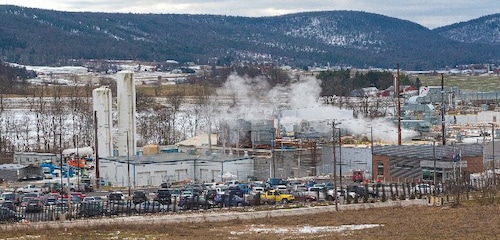LOGANTON A sizable Clinton County cattle processor has sought for a permit, which, if granted, would probably enable it to start building its sustainable resource management facility (SRF) again.
In June, Greene Township compelled Nicholas Meat, located close to Loganton, to halt the construction of its advanced wastewater treatment facility and waste-to-energy technology project.
Until Nicholas received a water quality management permit from the state Department of Environmental Protection, the supervisors would not accept the land development plan.
Nicholas needs the approval in order to add a 13,000-gallon sewage treatment plant.
Nicholas was permitted to construct a temporary 20,000-gallon holding tank in 2018 despite being informed that its sewage infrastructure was insufficient for its 350 employees and 150 contract workers at the time.
Septic system effluent is currently transported off-site for treatment.
Nichols will build a facility to treat sanitary wastewater to Class A levels for discharge into an engineered ground water channel if the water quality management permit is granted.
The township was told by DEP, which views the SRF and the sewage treatment plant extension as a one project, not to grant any building permits that might increase domestic sewage.
The SRF’s construction might have been completed in a number of months, according to meat regulatory and sustainability manager Duane Eichenlaub.
Nicholas stated that he will proceed with the SRF’s development after DEP grants the permit. Eichenlaub said he was hopeful it would be accepted in 2025.
According to Nicholas, up to 90% of the water used by the plant’s activities will be reused once the SRF is up and running.
We know how important the benefits are to the people of Sugar Valley and the environment, so we want to see this project through to completion, no matter what challenges we face along the road, he said.
When construction began in 2021, the SRF was expected to cost $50 million. Today, the price is much higher, according to Eichenlaub.
According to him, the plant’s activities and the contemporary barn that was finished in May have not been impacted by the SRF’s halt.
The barn, which has space for up to 1,000 cattle, was built so that the pens could be cleaned using recovered wastewater from the SRF.
According to the corporation, the SRF will lessen reliance on land application of food processing residues once it is operating.
After DEP forbade the residuals’ application on snow-covered fields in 2021, the factory was closed for a few weeks.
Stories by
John Beauge
Note: Every piece of content is rigorously reviewed by our team of experienced writers and editors to ensure its accuracy. Our writers use credible sources and adhere to strict fact-checking protocols to verify all claims and data before publication. If an error is identified, we promptly correct it and strive for transparency in all updates, feel free to reach out to us via email. We appreciate your trust and support!

